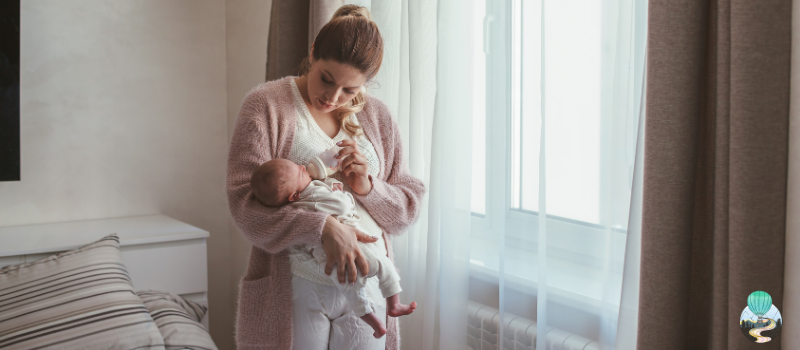If you’ve had a baby, or even if you haven’t yet, you can relate to the feelings of worry that come with this tiny human. How do I feed this baby? Why is this baby crying? Am I doing this right? Those are all very normal feelings, it’s hard to have a new baby and some amount of worry is totally normal. But as your Colorado postpartum doula, I want to talk about postpartum anxiety (PPA) today.
Postpartum anxiety is when your worries become overbearing and all-consuming. They will consume you and often the people around you when your natural worries become obsessions. When you can’t focus anymore because you have these gut-wrenching fears that just won’t go away. For some, PPA is hard to distinguish from regular worries but it’s important to talk about.
PPA is more than just normal new-parent worries (or even seasoned parents who just added a new baby to the mix). Some amount of worry is normal. But when it becomes too much to handle, or it becomes all you can think about, that’s when it crosses the line to full-blown postpartum anxiety.
PPA is different from its better-known counterpart, postpartum depression – the kind of long-lasting depressive feelings that some parents get after birth that just won’t go away as baby blues do. PPA, on the other hand, is characterized by anxious feelings, rather than sadness.
And as a top Colorado postpartum doula, I see PPA more than you might think. And it makes sense. You just added this tiny, helpless baby to your family and you love that baby more than you can say. Your world has been rocked and your body is going through a lot. It’s easy to go from a little bit of worry to a whole lot of anxiety before you even realize it.
Just like anything, PPA is a medical condition. Likely an imbalance in your brain. It is nothing to be ashamed of and it’s okay if it’s happening to you. I’m here to offer my support (not diagnosis) and help you find the help you need.
So how do you tell if you have regular worries about a new baby or need to work with a professional that can rule out PPA for you? Here’s what to look for:
- PPA is often characterized as Generalized Anxiety Disorder, meaning it follows many of the same symptoms associated with that diagnosis. According to the ADAA, “Generalized Anxiety Disorder (GAD) is characterized by persistent and excessive worry about a number of different things.”
- Symptoms can range in severity and type but may include things like spiraling thoughts, excessive fears, hypervigilance, inability to sleep, constant irritability, and obsessing about the future, finding problems that are not there, and unlikely scenarios.
- PPA may also present as physical symptoms mirroring a panic attack including a racing heart, insomnia, chest pain, dizziness, or shortness of breath.
- PPA may also just present as feeling utterly overwhelmed and unable to make basic decisions like what to do or what to eat.
- It’s impossible for you to believe something is going well or right with what you are doing or the behavior your baby is showing.
If you fear you’re battling PPA, first, let me give you a big ole hug through the computer screen. It is SO hard to be a parent anyway, but it’s even harder when you’re going through something like PPA. I know the feeling of anxiety and I am here as a resource to you.
First, let’s work on getting you some help, okay? The GOOD news is there are great resources now for parents facing both PPA and PPD. We just know so much more about it than we ever did before and it’s significantly less stigmatized than it once was. As a Colorado postpartum doula, I can tell you many of my clients have been where you are and it IS possible to feel better.
Here are some other things you should do right now:
- Take care of you: You know I love a good self-care blog topic, but this is much more serious than that. If you’re facing PPA, you need help and you’re 10000% worth taking care of. You’ll be a better partner, parent, and person if you’re not dealing with as much anxiety. You cannot ignore this problem, you must prioritize yourself in this case.
- Tell someone you trust: Be it me, your partner, or your midwife, a doctor, please start by telling someone what’s going on. We all love you and want you to be at your best, no matter what you’re going through. We’re here to support you and we want you to be well. Telling someone you trust is the first step to feeling better.
- Look for support: One of the hardest things about being a new parent is feeling alone. If you are feeling particularly alone, look for a new parent or breastfeeding support groups. For my clients, I have a group that meets weekly. There are many others in our community and groups are a great place to get support and find people going through the same thing.
- Reach out: I’m no doctor and I don’t pretend to be, but I have many wonderful colleagues in the space that I can connect you with to get you on the path to feeling more like yourself. You can send me a message at any point and I promise I’ll be there to listen and help navigate you toward the treatment resources you need.
- Talk to your doctor: It’s okay to admit you need help. You might be reading this right now, thinking that this will go away on its own. But chances are good that if you’ve been dealing with this for more than a couple of weeks, it might be here for the long haul without intervention. Doctors are trained and ready to help with this sort of thing, don’t be ashamed to admit you need help.
- Avoid (Unchill) Facebook Groups: What did you just say, Julianne? Yeah, I said it! Western culture loves drama and often does a really good job feeding your anxiety on social media. If you are going to join a group just make sure to avoid the ones that instill fear, judgment and make you feel like a horrible parent. Ain’t nobody got time for that (especially as a new parent!)
- Get some sleep: If you have been diagnosed with PPA sleep is not going to take it away but EVERYTHING in life is more manageable when we sleep. Everything feels worse when we are tired. It’s hard to cope, heal, think clearly, and be the parents we want to be when we are not getting the sleep we need. Make sleep a priority even if that means you need to ask for help at night, force yourself to nap, adjust routines or get help from someone outside the home.
If you’re reading this blog and finding yourself admitting that you may be dealing with PPA, know that I’m rooting for you. You’re incredibly strong and the very first step is admitting you could use help. I want you to feel better and get the support you need so you can enjoy those babies!
That baby needs you. Be sure to take care of yourself and your mental health so you can be present, connect with the baby, and enjoy the ride (as much as you can, anyway!).
As your Colorado postpartum doula, I’m here for all life’s ups and downs, be it PPA or otherwise. If you need support, please don’t hesitate to contact me.
All my love,
Julianne



Recent Comments